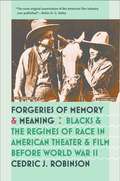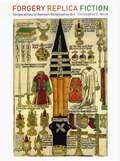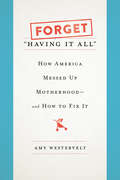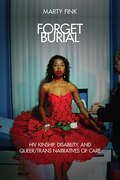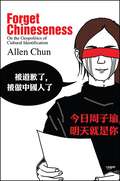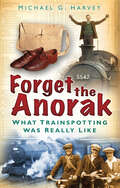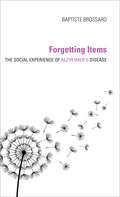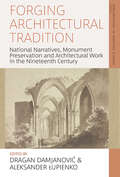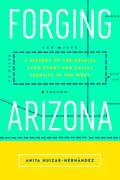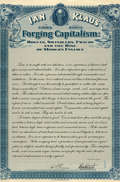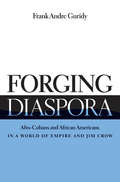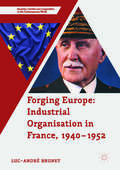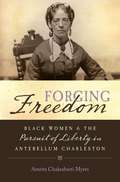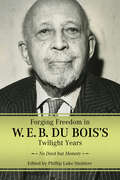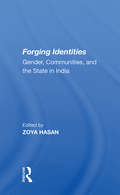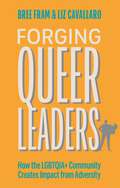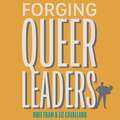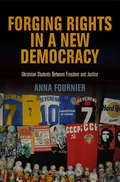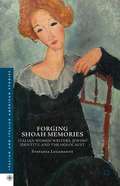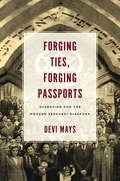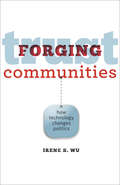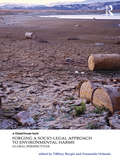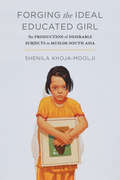- Table View
- List View
Forgeries of Memory and Meaning
by Cedric J. RobinsonCedric J. Robinson offers a new understanding of race in America through his analysis of theater and film of the early twentieth century. He argues that economic, political, and cultural forces present in the eras of silent film and the early "talkies" firmly entrenched limited representations of African Americans.Robinson grounds his study in contexts that illuminate the parallel growth of racial beliefs and capitalism, beginning with Shakespearean England and the development of international trade. He demonstrates how the needs of American commerce determined the construction of successive racial regimes that were publicized in the theater and in motion pictures, particularly through plantation and jungle films. In addition to providing new depth and complexity to the history of black representation, Robinson examines black resistance to these practices. Whereas D. W. Griffith appropriated black minstrelsy and romanticized a national myth of origins, Robinson argues that Oscar Micheaux transcended uplift films to create explicitly political critiques of the American national myth. Robinson's analysis marks a new way of approaching the intellectual, political, and media racism present in the beginnings of American narrative cinema.
Forgery, Replica, Fiction: Temporalities of German Renaissance Art
by Christopher WoodToday we often identify artifacts with the period when they were made. In more traditional cultures, however, such objects as pictures, effigies, and buildings were valued not as much for their chronological age as for their perceived links to the remote origins of religions, nations, monasteries, and families. As a result, Christopher Wood argues, pre-modern Germans tended not to distinguish between older buildings and their newer replacements, or between ancient icons and more recent forgeries. But Wood shows that over the course of the fifteenth and early sixteenth centuries, emerging replication technologies-- such as woodcut, copper engraving, and movable type-- altered the relationship between artifacts and time. Mechanization highlighted the artifice, materials, and individual authorship necessary to create an object, calling into question the replica's ability to represent a history that was not its own. Meanwhile, print catalyzed the new discipline of archaeological scholarship, which began to draw sharp distinctions between true and false claims about the past. Ultimately, as forged replicas lost their value as historical evidence, they found a new identity as the intentionally fictional image-making we have come to understand as art.
Forget "Having It All": How America Messed Up Motherhood--and How to Fix It
by Amy WesterveltA clear-eyed look at the history of American ideas about motherhood, how those ideas have impacted all women (whether they have kids or not), and how to fix the inequality that exists as a result. After filing a story only two hours after giving birth, and then getting straight back to full-time work the next morning, journalist Amy Westervelt had a revelation: America might claim to revere motherhood, but it treats women who have children like crap. From inadequate maternity leave to gender-based double standards, emotional labor to the "motherhood penalty" wage gap, racist devaluing of some mothers and overvaluing of others, and our tendency to consider women's value only in terms of their reproductive capacity, Westervelt became determined to understand how we got here and how the promise of "having it all" ever even became a thing when it was so far from reality for American women. In Forget "Having It All," Westervelt traces the roots of our modern expectations of mothers and motherhood back to extremist ideas held by the first Puritans who attempted to colonize America and examines how those ideals shifted--or didn't--through every generation since. Using this historical backdrop, Westervelt draws out what we should replicate from our past (bringing back home economics, for example, this time with an emphasis on gender-balanced labor in the home), and what we must begin anew as we overhaul American motherhood (including taking a more intersectional view of motherhood, thinking deeply about the ways in which capitalism influences our views on reproduction, and incorporating working fathers into discussions about work-life balance). In looking for inspiration elsewhere in the world, Westervelt turned not to Scandinavia, where every work-life balance story inevitably ends up, but to Japan where politicians, in an increasingly desperate effort to increase the country's birth rates (sound familiar?), tried to apply Scandinavian-style policies atop a capitalist democracy not unlike America's, only to find that policy can't do much in the absence of cultural shift. Ultimately, Westervelt presents a measured, historically rooted and research-backed call for workplace policies, cultural norms, and personal attitudes about motherhood that will radically improve the lives of not just working moms but all Americans.
Forget Burial: HIV Kinship, Disability, and Queer/Trans Narratives of Care
by Marty FinkQueers and trans people in the 1980s and early ‘90s were dying of AIDS and the government failed to care. Lovers, strangers, artists, and community activists came together take care of each other in the face of state violence. In revisiting these histories alongside ongoing queer and trans movements, this book uncovers how early HIV care-giving narratives actually shape how we continue to understand our genders and our disabilities. The queer and trans care-giving kinships that formed in response to HIV continue to inspire how we have sex and build chosen families in the present. In unearthing HIV community newsletters, media, zines, porn, literature, and even vampires, Forget Burial bridges early HIV care-giving activisms with contemporary disability movements. In refusing to bury the legacies of long-term survivors and of those we have lost, this book brings early HIV kinships together with ongoing movements for queer and trans body self-determination.
Forget Chineseness: On the Geopolitics of Cultural Identification (SUNY series in Global Modernity)
by Allen ChunForget Chineseness provides a critical interpretation of not only discourses of Chinese identity—Chineseness—but also of how they have reflected differences between "Chinese" societies, such as in Hong Kong, Taiwan, People's Republic of China, Singapore, and communities overseas. Allen Chun asserts that while identity does have meaning in cultural, representational terms, it is more importantly a product of its embeddedness in specific entanglements of modernity, colonialism, nation-state formation, and globalization. By articulating these processes underlying institutional practices in relation to public mindsets, it is possible to explain various epistemic moments that form the basis for their sociopolitical transformation.From a broader perspective, this should have salient ramifications for prevailing discussions of identity politics. The concept of identity has not only been predicated on flawed notions of ethnicity and culture in the social sciences but it has also been acutely exacerbated by polarizing assumptions that drive our understanding of identity politics.
Forget the Anorak: What Trainspotting Was Really Like
by Michael G HarveyMichael Harvey's new book brings to its reader the excitement of trainspotting in the 1950s and 60s, the hobby's heyday. It was the advent of the famous Ian Allan ABC Locospotters books that really gave the hobby the impetus, as they gave transpotters all the information they required. Forget the Anorak sets out to provide the reader with a personal account of what the hobby entailed - teenagers roaming the railways of Britain, sleeping on deserted platforms on porters' trolleys, 'bunking' dimly lit depots and eluding capture, travelling hundreds of miles ona platform ticket, and stink bombs on the Underground. You'll be able to smell the steam, soot and unwashed socks, and taste the boiled egg sandwiches, the chips wrapped in newspaper and the hot jam doughnuts, all washed down with warm Tizer. Illustrated with Michael Harvey's own photographs and a selection of maps, Forget the Anorak will appeal to anyone who experienced the golden days of trainspotting, as well as to anyone interested in the social history of Britain after the Second World War.
Forgetting Items: The Social Experience of Alzheimer's Disease
by Baptiste BrossardA book that’s “in the upper echelons of social dementia research . . . an entertaining and revelatory contribution to the field” (Symbolic Interaction).Alzheimer’s disease has not only profound medical consequences for the individual experiencing it but a life-changing impact on those around them. From the moment a person is suspected to be suffering from Alzheimer’s or another form of dementia, the interactions they encounter progressively change. Forgetting Items focuses on that social experience of Alzheimer’s, delineating the ways disease symptoms manifest and are understood through the interactions between patients and the people around them. Mapping out those interactions takes readers through the offices of geriatricians, into patients’ narratives and interviews with caregivers, down the corridors of nursing homes, and into the discourses shaping public policies and media coverage. Revealing the everyday experience of Alzheimer’s helps us better understand the depth of its impact and points us toward more knowledgeable, holistic ways to help treat the disease.“Considers the social aspect of dementia by considering how symptoms are expressed by the individual and understood/interpreted by those close to them. The author’s goal is to help us understand common experiences associated with dementia and ways to interpret those experiences through the lens of sociology.” —ISCHP (International Society of Critical Health Psychology)
Forgetting Items: The Social Experience of Alzheimer's Disease
by Baptiste BrossardA book that’s “in the upper echelons of social dementia research . . . an entertaining and revelatory contribution to the field” (Symbolic Interaction).Alzheimer’s disease has not only profound medical consequences for the individual experiencing it but a life-changing impact on those around them. From the moment a person is suspected to be suffering from Alzheimer’s or another form of dementia, the interactions they encounter progressively change. Forgetting Items focuses on that social experience of Alzheimer’s, delineating the ways disease symptoms manifest and are understood through the interactions between patients and the people around them. Mapping out those interactions takes readers through the offices of geriatricians, into patients’ narratives and interviews with caregivers, down the corridors of nursing homes, and into the discourses shaping public policies and media coverage. Revealing the everyday experience of Alzheimer’s helps us better understand the depth of its impact and points us toward more knowledgeable, holistic ways to help treat the disease.“Considers the social aspect of dementia by considering how symptoms are expressed by the individual and understood/interpreted by those close to them. The author’s goal is to help us understand common experiences associated with dementia and ways to interpret those experiences through the lens of sociology.” —ISCHP (International Society of Critical Health Psychology)
Forgetting Polish Violence Against the Jews: The Great Whitewash (Memory Studies: Global Constellations)
by Tomasz ŻukowskiDuring the Holocaust, Polish bystanders were witnesses not only to Nazi crimes but also to their own collective violence toward Jewish neighbors. This book shows how these memories continue to be distorted and silenced in the Polish culture.Considering the ways in which Polish culture displays symptoms of a suppressed and violent memory while obstinately refusing to see the meaning of such symptoms, the author shows how the narrative of the Holocaust, in threatening the self-image of the community, causes a continuous anxiety and thus compulsive and neurotic reactions. Through analyses of a wide range of literary, journalistic, commemorative, and cinematic texts, Forgetting Polish Violence Against the Jews sheds light on a set of narrative and discursive models connected with social practices, which serve to discipline individuals – especially Polish Jews – while generating pressure to defend both habits of silence and also an idealized selfimage of the Polish Christian majority.This book will appeal to scholars with interests in memory studies, cultural studies, Holocaust studies, and psychoanalytic studies.
Forging Architectural Tradition: National Narratives, Monument Preservation and Architectural Work in the Nineteenth Century (Explorations in Heritage Studies #4)
by Dragan Damjanović Aleksander ŁupienkoDuring the nineteenth century, a change developed in the way architectural objects from the distant past were viewed by contemporaries. Such edifices, be they churches, castles, chapels or various other buildings, were not only admired for their aesthetic values, but also for the role they played in ancient times, and their role as reminders of important events from the national past. Architectural heritage often was (and still is) an important element of nation building. Authors address the process of building national myths around certain architectural objects. National narratives are questioned, as is the position architectural heritage played in the nineteenth and the early twentieth centuries.
Forging Arizona: A History of the Peralta Land Grant and Racial Identity in the West (Latinidad: Transnational Cultures in the)
by Anita Huizar-HernándezIn Forging Arizona Anita Huizar-Hernández looks back at a bizarre nineteenth-century land grant scheme that tests the limits of how ideas about race, citizenship, and national expansion are forged. During the aftermath of the U.S.-Mexico War and the creation of the current border, a con artist named James Addison Reavis falsified archives around the world to pass his wife off as the heiress to an enormous Spanish land grant so that they could claim ownership of a substantial portion of the newly-acquired Southwestern territories. Drawing from a wide variety of sources including court records, newspapers, fiction, and film, Huizar-Hernández argues that the creation, collapse, and eventual forgetting of Reavis’s scam reveal the mechanisms by which narratives, real and imaginary, forge borders. An important addition to extant scholarship on the U.S Southwest border, Forging Arizona recovers a forgotten case that reminds readers that the borders that divide nations, identities, and even true from false are only as stable as the narratives that define them.
Forging Capitalism
by Ian KlausVice is endemic to Western capitalism, according to this fascinating, wildly entertaining, often startling history of modern finance. Ian Klaus's Forging Capitalism demonstrates how international financial affairs in the nineteenth century were conducted not only by gentlemen as a noble pursuit but also by connivers, thieves, swindlers, and frauds who believed that no risk was too great and no scheme too outrageous if the monetary reward was substantial enough. Taken together, the grand deceptions of the ambitious schemers and the determined efforts to guard against them have been instrumental in creating the financial establishments of today. In a story teeming with playboys and scoundrels and rich in colorful and amazing events, Klaus chronicles the evolution of trust through three distinct epochs: the age of values, the age of networks and reputations, and, ultimately, in a world of increased technology and wealth, the age of skepticism and verification. In today's world, where the questionable dealings of large international financial institutions are continually in the spotlight, this extraordinary history has great relevance, offering essential lessons in both the importance and the limitations of trust.
Forging Diaspora: Afro-cubans and African Americans in a World of Empire and Jim Crow
by Frank Andre GuridyCuba's geographic proximity to the United States and its centrality to U. S. imperial designs following the War of 1898 led to the creation of a unique relationship between Afro-descended populations in the two countries. In Forging Diaspora, Frank Andre Guridy shows that the cross-national relationships nurtured by Afro-Cubans and black Americans helped to shape the political strategies of both groups as they attempted to overcome a shared history of oppression and enslavement. Drawing on archival sources in both countries, Guridy traces four encounters between Afro-Cubans and African Americans. These hidden histories of cultural interaction--of Cuban students attending Booker T. Washington's Tuskegee Institute, the rise of Garveyism, the Havana-Harlem cultural connection during the Harlem Renaissance and Afro-Cubanism movement, and the creation of black travel networks during the Good Neighbor and early Cold War eras--illustrate the significance of cross-national linkages to the ways both Afro-descended populations negotiated the entangled processes of U. S. imperialism and racial discrimination. As a result of these relationships, argues Guridy, Afro-descended peoples in Cuba and the United States came to identify themselves as part of a transcultural African diaspora.
Forging Europe: Industrial Organisation in France, 1940–1952
by Luc-André BrunetThis book is a detailed and original look at the radical reorganisation of French heavy industry in the turbulent period between the establishment of the Vichy regime in 1940 and the creation of the European Coal and Steel Community (ECSC), the forerunner to the European Union, in 1952. By studying institutions ranging from Vichy’s Organisation Committees to Jean Monnet’s Commissariat Général du Plan (CGP), Luc-André Brunet challenges existing narratives and reveals significant continuities from Vichy to post-war initiatives such as the Monnet Plan and the ECSC. Based on extensive multi-archival research, this book sheds important new light on economic collaboration and resistance in Vichy, the post-war revival of the French economy, and the origins of European integration.
Forging Freedom
by Amrita Chakrabarti MyersFor black women in antebellum Charleston, freedom was not a static legal category but a fragile and contingent experience. In this deeply researched social history, Amrita Chakrabarti Myers analyzes the ways in which black women in Charleston acquired, defined, and defended their own vision of freedom. Drawing on legislative and judicial materials, probate data, tax lists, church records, family papers, and more, Myers creates detailed portraits of individual women while exploring how black female Charlestonians sought to create a fuller freedom by improving their financial, social, and legal standing. Examining both those who were officially manumitted and those who lived as free persons but lacked official documentation, Myers reveals that free black women filed lawsuits and petitions, acquired property (including slaves), entered into contracts, paid taxes, earned wages, attended schools, and formed familial alliances with wealthy and powerful men, black and white--all in an effort to solidify and expand their freedom. Never fully free, black women had to depend on their skills of negotiation in a society dedicated to upholding both slavery and patriarchy. Forging Freedom examines the many ways in which Charleston's black women crafted a freedom of their own design instead of accepting the limited existence imagined for them by white Southerners.
Forging Freedom in W. E. B. Du Bois's Twilight Years: No Deed but Memory (Margaret Walker Alexander Series in African American Studies)
by Phillip Luke SinitiereContributions by Murali Balaji, Charisse Burden-Stelly, Christopher Cameron, Carlton Dwayne Floyd, Robert Greene II, Andre E. Johnson, Werner Lange, Lisa J. McLeod, Jodi Melamed, Tyler Monson, Eric Porter, Reiland Rabaka, Thomas Ehrlich Reifer, Camesha Scruggs, and Phillip Luke Sinitiere Although the career of W. E. B. Du Bois was remarkable in its entirety, a large majority of scholarship focuses on the first five or six decades. Overlooked and understudied, the closing three decades of Du Bois’s career reflect a generative period of his life in terms of teaching, travel, activism, and publications. Forging Freedom in W. E. B. Du Bois's Twilight Years: No Deed but Memory proposes to narrate the political, social, and cultural significance of Du Bois’s career during the controversial closing three decades of his life. Du Bois’s twilight years were tremendously controversial: his persistent criticism of the collusion between capitalism and racism and his choice to join the Communist Party in late 1961 raised the ire of many. At the time, Du Bois’s strident advocacy of socialism and turn to communism during the Cold War oriented most scholars away from delving into his late career. While only a few scholars have engaged the productivity of Du Bois’s later years, the fact is that an anticommunist, antiradical animus has followed Du Bois in the half century since his death. As a result, Du Bois scholarship remains impoverished to the extent that academics neglect his later years. The essays in Forging Freedom in W. E. B. Du Bois's Twilight Years detail selected aspects of Du Bois’s later decades and their particular connection to American social, political, and cultural history between the 1930s and the 1960s. While international concerns and a global perspective also fundamentally defined Du Bois’s latter years, chronicling his final decades in a US context presents fresh insight into his twilight years. Du Bois’s commitment to freedom’s flourishing during this period animated the Black freedom struggle’s war against white supremacy. Ultimately, this book demonstrates that the durability of Du Bois’s intellectual achievements remains relevant to the twenty-first century.
Forging Identities: Gender, Communities, And The State In India
by Zoya HasanThis volume challenges the assumption that Muslims in India constitute a homogeneous community. Focusing specifically on gender issues, the contributors instead locate the Muslim womens community within the social, economic, and political developments that have taken place in the subcontinent, pre- and post-Independence, in order to examine how the
Forging Queer Leaders: How the LGBTQIA+ Community Creates Impact from Adversity
by Bree Fram Elizabeth CavallaroLGBTQ+ individuals disproportionately encounter bias, adversity, stigma, and marginalization throughout their lives. It's an enormous obstacle - but also prepares them for leadership in a fast-moving, volatile, uncertain, complex, and adaptive working world.The book explores the unique and inspiring developmental experiences of LGBTQ+ leaders, the amazing capabilities they bring to teams, and what that means for everyone pursuing positive and inclusive organizational strategy. With stories from the armed forces, lawyers, entrepreneurs, authors, academics, thought-leaders, medical professionals - you name it - this shows how queer folk everywhere are harnessing their hard-won power and resilience to excel.With a history of excellence in queer leadership, the contextual underpinning of adversity and resilience theory, and uplifting stories and soundbites from queer game-changers in every field - this is an essential resource for LGBTQ+ individuals, allies, advocates, business professionals and leaders of all kinds.
Forging Queer Leaders: How the LGBTQIA+ Community Creates Impact from Adversity
by Bree Fram Elizabeth CavallaroLGBTQ+ individuals disproportionately encounter bias, adversity, stigma, and marginalization throughout their lives. It's an enormous obstacle - but also prepares them for leadership in a fast-moving, volatile, uncertain, complex, and adaptive working world.The book explores the unique and inspiring developmental experiences of LGBTQ+ leaders, the amazing capabilities they bring to teams, and what that means for everyone pursuing positive and inclusive organizational strategy. With stories from the armed forces, lawyers, entrepreneurs, authors, academics, thought-leaders, medical professionals - you name it - this shows how queer folk everywhere are harnessing their hard-won power and resilience to excel.With a history of excellence in queer leadership, the contextual underpinning of adversity and resilience theory, and uplifting stories and soundbites from queer game-changers in every field - this is an essential resource for LGBTQ+ individuals, allies, advocates, business professionals and leaders of all kinds.
Forging Rights in a New Democracy
by Anna FournierThe last two decades have been marked by momentous changes in forms of governance throughout the post-Soviet region. Ukraine's political system, like those of other formerly socialist states of Eastern Europe, has often been characterized as being "in transition," moving from a Soviet system to one more closely aligned with Western models. Anna Fournier challenges this view, investigating what is increasingly recognized as a critical aspect of contemporary global rights discourse: the active involvement of young people living in societies undergoing radical change. Fournier delineates a generation simultaneously embracing various ideological stances in an attempt to make sense of social conditions marked by the disjuncture between democratic ideals and the everyday realities of growing economic inequality.Based on extensive fieldwork in public and private schools in the Ukrainian capital city of Kyiv, Forging Rights in a New Democracy explores high-school-aged students' understanding of rights and justice, and the ways they interpret and appropriate discourses of citizenship and civic values in the educational setting and beyond. Fournier's rich ethnographic account assesses the impact on the making of citizens of both formal and informal pedagogical practices, in schools and on the streets. Chronicling her subjects' encounters with state representatives and "violent entrepreneurs" as well as their involvement in peaceful protests alongside political activists, Fournier demonstrates the extent to which young people both reproduce and challenge the liberal discourse of rights in ways that illuminate the everyday paradoxes of market democracy. By tracking students' active participation in larger contests about the nature of liberty and entitlement in the context of redefined rights, her book provides insight into emergent configurations of citizenship in the New Europe.
Forging Shoah Memories
by Stefania LucamanteDespite an outpouring in recent years of history and cultural criticism related to the Holocaust, Italian women's literary representations and testimonies have not received their proper due. This project fills this gap by analyzing Italian women's writing from a variety of genres, all set against a complex historical backdrop.
Forging Ties, Forging Passports: Migration and the Modern Sephardi Diaspora (Stanford Studies in Jewish History and Culture)
by Devi MaysForging Ties, Forging Passports is a history of migration and nation-building from the vantage point of those who lived between states. Devi Mays traces the histories of Ottoman Sephardi Jews who emigrated to the Americas—and especially to Mexico—in the late nineteenth and early twentieth centuries, and the complex relationships they maintained to legal documentation as they migrated and settled into new homes. Mays considers the shifting notions of belonging, nationality, and citizenship through the stories of individual women, men, and families who navigated these transitions in their everyday lives, as well as through the paperwork they carried. In the aftermath of World War I and the Mexican Revolution, migrants traversed new layers of bureaucracy and authority amid shifting political regimes as they crossed and were crossed by borders. Ottoman Sephardi migrants in Mexico resisted unequivocal classification as either Ottoman expatriates or Mexicans through their links to the Sephardi diaspora in formerly Ottoman lands, France, Cuba, and the United States. By making use of commercial and familial networks, these Sephardi migrants maintained a geographic and social mobility that challenged the physical borders of the state and the conceptual boundaries of the nation.
Forging Trust Communities: How Technology Changes Politics
by Irene S. WuTwenty historical case studies reveal how communication technology allows people to trust one another while mobilizing around a shared cause.Bloggers in India used social media and wikis to broadcast news and bring humanitarian aid to tsunami victims in South Asia. Terrorist groups like ISIS pour out messages and recruit new members on websites. The Internet is the new public square, bringing to politics a platform on which to create community at both the grassroots and bureaucratic level. Drawing on historical and contemporary case studies from more than ten countries, Irene S. Wu’s Forging Trust Communities argues that the Internet, and the technologies that predate it, catalyze political change by creating new opportunities for cooperation. The Internet does not simply enable faster and easier communication, but makes it possible for people around the world to interact closely, reciprocate favors, and build trust. The information and ideas exchanged by members of these cooperative communities become key sources of political power akin to military might and economic strength. Wu illustrates the rich world history of citizens and leaders exercising political power through communications technology. People in nineteenth-century China, for example, used the telegraph and newspapers to mobilize against the emperor. In 1970, Taiwanese cable television gave voice to a political opposition demanding democracy. Both Qatar (in the 1990s) and Great Britain (in the 1930s) relied on public broadcasters to enhance their influence abroad. Additional case studies from Brazil, Egypt, the United States, Russia, India, the Philippines, and Tunisia reveal how various technologies function to create new political energy, enabling activists to challenge institutions while allowing governments to increase their power at home and abroad. Forging Trust Communities demonstrates that the way people receive and share information through network communities reveals as much about their political identity as their socioeconomic class, ethnicity, or religion. Scholars and students in political science, public administration, international studies, sociology, and the history of science and technology will find this to be an insightful and indispensable work.
Forging a Socio-Legal Approach to Environmental Harms: Global Perspectives (Law, Justice and Ecology)
by Tiffany Bergin Emanuela OrlandoEnvironmental harms exert a significant toll and pose substantial economic costs on societies around the world. Although such harms have been studied from both legal and social science perspectives, these disciplinary-specific approaches are not, on their own, fully able to address the complexity of these environmental challenges. Many legal approaches, for example, are limited by their inattention to the motivations behind environmental offences, whereas many social science approaches are hindered by an insufficient grounding in current legislative frameworks. This edited collection constitutes a pioneering attempt to overcome these limitations by uniting legal and social science perspectives. Together, the book’s contributors forge an innovative socio-legal approach to more effectively respond to, and to prevent, environmental harms around the world. Integrating theoretical and empirical work, the book presents carefully selected illustrations of how legal and social science scholarship can be brought together to improve policies. The various chapters examine how a socio-legal approach can ultimately lead to a more comprehensive understanding of environmental harms, as well as to innovative and effective responses to such environmental offences.
Forging the Ideal Educated Girl: The Production of Desirable Subjects in Muslim South Asia (Islamic Humanities)
by Shenila Khoja-MooljiAt publication date, a free ebook version of this title will be available through Luminos, University of California Press’s Open Access publishing program. Visit www.luminosoa.org to learn more. In Forging the Ideal Educated Girl, Shenila Khoja-Moolji traces the figure of the ‘educated girl’ to examine the evolving politics of educational reform and development campaigns in colonial India and Pakistan. She challenges the prevailing common sense associated with calls for women’s and girls’ education and argues that such advocacy is not simply about access to education but, more crucially, concerned with producing ideal Muslim woman-/girl-subjects with specific relationships to the patriarchal family, paid work, Islam, and the nation-state. Thus, discourses on girls’/ women’s education are sites for the construction of not only gender but also class relations, religion, and the nation.
